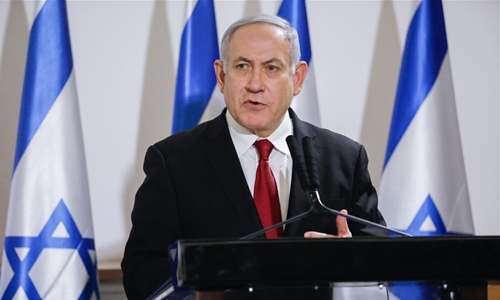HOME >> WORLD
Israeli PM Netanyahu asks parliament for immunity
Source:AFP Published: 2020/1/2 20:23:41

File photo taken on Nov. 12, 2019 shows Israeli Prime Minister Benjamin Netanyahu attending a press conference in Tel Aviv, Israel. Israeli Attorney General Avichai Mandelblit announced on Nov. 21 that Prime Minister Benjamin Netanyahu had been indicted in a series of corruption cases. The indictment marks the first time an incumbent prime minister is being charged with bribery. (Gideon Markowicz/JINI via Xinhua)
Israeli Prime Minister Benjamin Netanyahu on Wednesday asked parliament for immunity, weeks after the embattled premier was indicted on a range of corruption charges.
Netanyahu, Israel's longest-serving premier, is fighting for his political survival on two fronts - the corruption allegations and stiff opposition from a new centrist party.
The immunity request is expected to delay the start of court proceedings for months, as lawmakers are not due to vote on the matter until after March 2 elections.
The request is "in line with the law... [and] with the goal of continuing to serve you, for the future of Israel," Netanyahu told reporters in Jerusalem.
His spokesman Ofer Golan later confirmed the request had been submitted to the speaker of Israel's parliament, the Knesset.
Netanyahu was charged by the attorney general in November with bribery, fraud and breach of trust in three separate corruption cases.
The leader of the right-wing Likud party denies the allegations and accuses prosecutors and the media of a witch hunt.
Reacting to the premier's announcement, his rival Benny Gantz, the leader of the centrist Blue and White party, said "Netanyahu knows that he is guilty."
Gantz said his own party will do everything it can to "prevent immunity."
"In Israel, nobody is above the law," he said.
A sitting prime minister is only required to step down once convicted and after all avenues of appeal have been exhausted.
But legal experts have asked the Supreme Court to rule on whether a premier can be tasked by the president with forming a new government while under indictment.
A panel of three judges began looking into the matter on Tuesday, and said they would make a ruling at a later time, without giving a date.
Netanyahu has described the legal initiative as a trap.
But "I don't for a moment think that Israel's Supreme Court will fall into this trap. In a democracy, only the people decide who will lead them, and nobody else," Netanyahu said on Twitter on Tuesday.
Allegations against the premier include receiving gifts worth thousands of dollars and offering to change regulations in exchange for positive media coverage. Despite his legal woes, Netanyahu remains popular within Likud and last week secured a landslide victory in a leadership challenge.
Posted in: MID-EAST